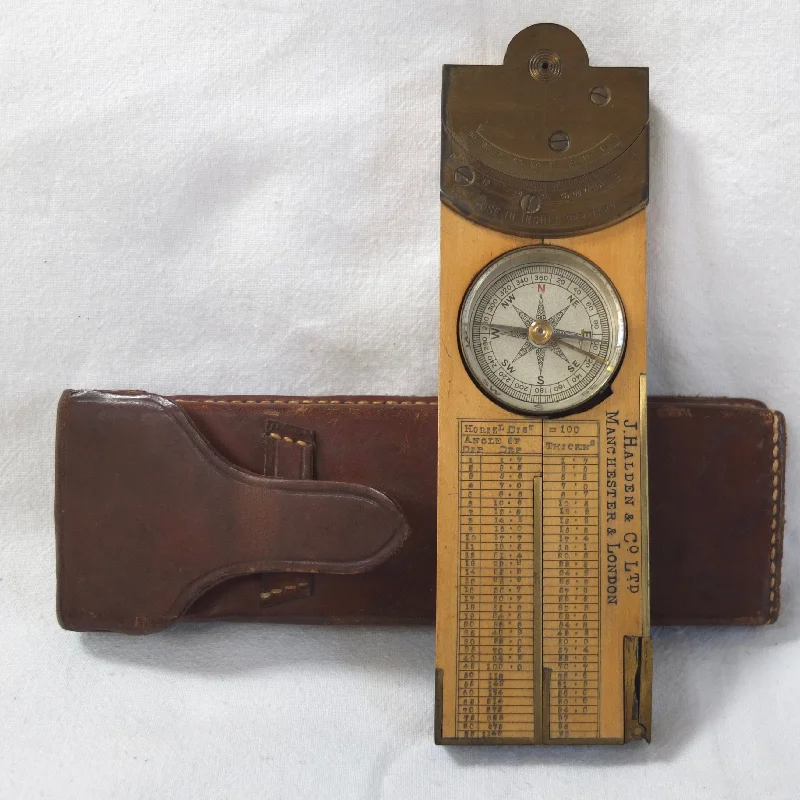This compass is inscribed with the name and details of it's original owner, Lieutenant Charles Bertram Brockbank, 6th Cheshire Regiment and 118th M.G. Coy., one of the very few officers known to have been present at a 1914 'Christmas Truce’ football match. Lt Brockbank wrote a very detailed diary recording his service in the trenches of the Western Front from 1914 to November 1916. The diary includes his eyewitness account of the famous football match played between men of his battalion (attached to the 1st Norfolks at the time) and a German regiment, in no mans land near Wulverghem (close to Messines and Ploegsteert Wood), on Christmas Day 1914:
Dec 24th:
'I have got a new rifle from the armourer in exchange for my old one so am very bucked with myself. Orders have just arrived saying we are to go into the trenches for Xmas-Day which from my point of view is very disappointing, I had been hoping to spend it in billets. I should hate to be killed on Xmas-day it would not be right at all. It is freezing hard now’.
Dec 25th:
'I spent the most agonising night I ever remember, owing to the cold. It was freezing terribly hard and as we were in support trenches were not allowed fires. I was so cold and my feet so painful that I got out of the dugout and walked about, there was not much danger, stamping my feet till 4.30am, then was so fagged out I fell asleep but kept on waking owing to the pain of my feet, I quite thought I was frost-bitten. 7am. It was beginning to grow light but as there was a lot of mist I told the men they could light fires. They did not need telling twice. There is a farmhouse to the rear of the trenches where hens abound, also dead pigs, so taking two men with me we went on a henhunt. They fly like pheasants so took some catching and in about ten minutes there were about 60 men in the hunt. The fog lasted till about mid-day so we had good fun, getting in all eleven hens, one of which I brought back for tomorrow’s dinner.
Now for the extraordinary incident. At about 2.30 all firing ceased and the Germans started shouting to us “Come out”, “Have a drink”, and then one of them climbed out of the trench without his equipment on so one of ours did the same. It ended in a 'Mother’s Meeting', nearly every man of our trench, except machine gunners, was out and a huge crowd was between the trenches. Someone produced a little rubber ball so of course a football match started. We exchanged various things and I got a cap-badge, belt buckle, whistle, rifle cartridge, purse and tea tablets, not to mention getting about four Germans’ names and address in their own handwriting on field service postcards, as a positive proof that it all really did happen, because it will naturally sound a very tall story when it gets told in the billets.'
Lieutenant Brockbank’s diary featured in a special exhibition at the National Football Museum in Manchester in 2015. The diary is now held at the Cheshire Regiment Museum in Chester, and is also available to read online. Many newspaper articles have also been written about Lt Brockbank’s experiences in 1914. His account of the December 25th truce and football match was confirmed by the testimony of other men of the Cheshire Regiment who were there at the time, including Pte. Ernie Williams and Sgt. Major Naden.
Lieutenant Charles Bertram Brockbank (1894-1976) served with 6th Battalion of the Cheshire Regiment and the 118th Machine Gun Company, M.G.C. He was commissioned in September 1914 and served in France and Belgium until November 1916. His last diary entry was on 12th Nov 1916:
‘Sunday. Moved up to the Schwaben this afternoon and got a good idea of our “battle-positions”. The Huns put a fairly stiff barrage down on our position but did no great damage. We are to go over the top & take St Pierre Divion whilst the Royal Naval Division take Beaumont Hamel. It should be fairly exciting as we have to cross over a bare skyline'.
During the action on the following day, Lieutenant Brockbank was buried by a large shell and was then uncovered by another explosion. He was invalided home to England with shell-shock. On his release from hospital, he was posted to Harrowby Camp, M.G.T.C., Grantham as an assistant Quartermaster. He was due to go back overseas when the Armistice was signed.
Condition:
The compass is in very good condition and finds North very well. It is in full working order, with a fully functioning transit lock. The spirit levels and flip up lenses are in full working order, and the main brass hinge is working very smoothly. The compass rule has 'Lt. Brockbank, 118th M.G. Coy.’ written on the rear. The matching original leather case is in very good condition, with just the normal signs of age and use. It is inscribed in ink on the rear ‘Lt. C. B. Brockbank, 118th Machine Gun Coy.’ The 'housewife' mending kit (including numerous buttons, needles, a thimble and two rolls of cotton) is in good condition, with general signs of use. The original portrait photograph of Lt. Brockbank is in good condition.
Dimensions: 160mm x 48mm (compass diameter: 38mm), case 170mm x 50mm

